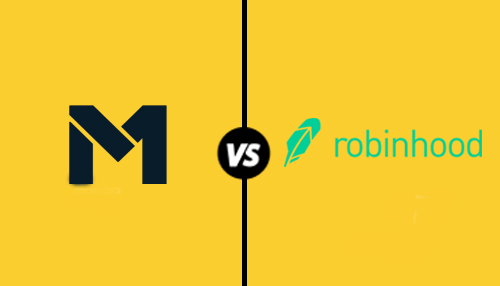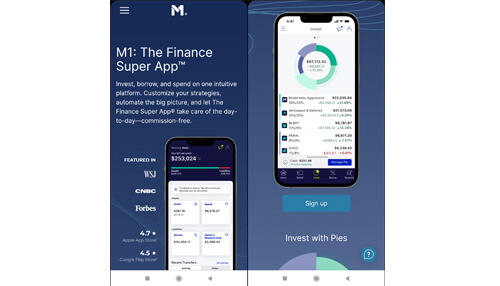When you’re picking platforms that will help you invest, the choice you make right now can and will affect you for years to come – choosing the right platform from the get-go is vital. In this review, we will go over two of the largest commission-free stock trading platforms in the US: M1 Finance and Robinhood.
Founded in 2015, M1 Finance is an online brokerage and financial services provider based in Illinois. It offers access to securities and derivatives from US markets as well as fractional shares and bonds. Additionally, it offers loaning, checking, and credit card services. M1 Finance is marketed towards beginners and experienced investors and is extremely user-friendly; Its mobile app has an average rating of 4.7 and 4.5 on the App Store and the Play Store, respectively.
Robinhood, on the other hand, is a more specific financial service provider – it focuses on online brokerage services and, since its inception in 2013, has amassed over 23 million active users. Like M1 Finance, it supports most types of securities, and it even has a – very limited – platform for trading crypto. Robinhood is headquartered in California and targets exclusively US citizens. Still, they are already looking to expand their operations into Europe.
In this M1 Finance vs. Robinhood review, we will compare the two platforms side by side, consider all the benefits and features of each, and make a recommendation based on the type of investor that will benefit the most from each platform.
Keep in mind this is a quick summary of these products; for a more in-depth analysis, check out our M1 Finance vs. Robinhood Full Review.
M1 Finance & Robinhood plans
M1 Finance and Robinhood have each a basic plan and a premium plan. The basic plan for both is free, and the Plus and Gold plans respectively use a subscription-based model. First, we will compare the two basic plans, starting with the similarities across all four plans:
- No monthly fees
- Access to Stocks, Options, and ETFs
- Set up recurring deposits
- Access to Fractional shares
- Available on mobile
- Insured by the SIPC for up to $500,000
- US markets only
Both platforms offer access to US markets only – NYSE, NASDAQ, among others -, and neither supports mutual funds.
M1 Finance Basic Plan vs. Robinhood Basic Plan
Now, we will compare side by side the M1 Finance basic plan and the Robinhood basic plan. For starters, both are completely free to use and offer zero monthly fees and zero trading commissions:
| Platform | M1 Finance | Robinhood |
| Monthly subscription | Free | Free |
| Trading Commissions | $0 | $0 |
| Minimum Deposit | $100 | $0 |
| Stocks, Options, and ETFs | Yes | Yes |
| Bonds | Yes | No |
| Recurring Deposits | Yes | Yes |
| Margin Trading | Yes (Min. $2000 balance) | No |
| Margin Trading interest rate | 3.5% | N/A |
| Fractional Shares | Yes | Yes |
| Transfer Out Fees | Free | $100 |
| Customizable Investments | Yes. (Pies) | No |
| Instant deposits | No. (Up to 6 days) | No. (Up to 5 days) |
| Trading Window | AM | AM and PM |
| Insured | Yes | Yes |
In terms of offerings, the M1 Finance basic plan comes slightly ahead of the Robinhood plan. Both offer access to stocks, options, and ETFs in US markets, but only the M1 supports bonds and other derivatives. Another downside of Robinhood is that it doesn’t support margin trading – at all – on their free account. Even on Robinhood’s premium account, the interests are higher than M1’s basic plan, which charges 3.5%.
M1 is a lot more customizable – through the use of their proprietary ‘Pies,’ investors can use a mix of premade portfolios, stocks, and ETFs to build their ideal portfolio, and the whole interface is extremely user-friendly.
Some of Robinhood’s highlights are its no minimum deposit (compared to M1’s $100 minimum deposit) and a slightly wider trading window.
Our Pick
Based on the features offered, the clear winner is M1 Finance. The wider trading windows and the no-minimum deposits on Robinhood are nowhere near enough to compensate for all the additional features and how user-friendly M1 is for both beginners and experienced investors.
Moving on to the M1 Finance Plus plan vs the Robinhood Gold plan.
M1 Finance Plus vs. Robinhood Gold Plan
| Platform | M1 Plus | Robinhood Gold |
| Subscription | $125/year | $5/month ($60.year) |
| Trading Commissions | Free | Free |
| Free trial | 90 days | 30 days |
| Stocks, Options, and ETFs | Yes | Yes |
| Bonds | Yes | No |
| Trading Commissions | $0 | $0 |
| Margin Trading Interest Rate | 2.0% | 4.25% |
| Fractional Shares | Yes | Yes |
| Transfer Out Fees | Free | $100 |
| Instant Deposits | No | Yes. Up to $50,000 instantly |
| Trading Window | AM and PM | AM and PM |
| Insured | Yes | Yes |
Starting with the fees, the Robinhood Gold plan is half of M1’s yearly plan, and it is a lot more flexible – you can stop paying the monthly fee of $5 and cancel the service at anytime. However, the M1 Plus plan comes with a whooping 3-month completely-free trial (compared to Robinhood’s 1-month trial), and it doesn’t charge fees at all when transferring out. For comparison, Robinhood charges a flat $100 transfer fee, which can be very significant for smaller investors.
The Robinhood Gold plan does offer margin trading (at 4.25% interest) – but it still falls short of M1’s 2.0% interest rates. The major benefit of the premium Robinhood plan is the instant deposits, which can be useful if you want to take advantage of short-lived opportunities.
Our Pick
Based on the features, fees, and overall flexibility, our recommendation is the M1 Finance Plus plan. Margin trading is cheaper, there are no transfer-out fees, and you can access all kinds of securities. The 3-month trial – unheard of in this kind of product – is a great bonus.
If you’re a numbers kind of person check out this post, where we go over some additional considerations and numerical analysis of these two platforms.
Sign-Up Process
Signing Up With M1 Finance
Signing up for M1 Finance is very easy and you can start trading in minutes. Here are the steps:
- Visit M1 Finance’s website
- Click the Get Started button on the top right
- Enter a valid email and confirm it by clicking the link they send
To activate the 90-day free trial immediately sign up using this link and you will gain access to M1 Borrow, M1 Spend, and other M1 perks, at no additional cost.
Signing Up With Robinhood
Technically anyone can register and create a Robinhood account, but the company mainly targets US citizens and US markets. To create an account, you only need a valid email address. Here are the steps:
- Visit Robinhood website
- Click Sign up on the top right
- Enter your email and await the confirmation link
To activate the 30-day free trial immediately, sign up using this link.
Choosing Your Plan
If you’re still unsure which service to pick, these are our recommendations.
- If you’re not looking to spend any money and just want to get a feel for trading platforms, you should pick the no-minimum deposit Robinhood basic plan.
- If you’re looking for a free, customizable investing platform and access to margin trading for a very low fee, you should pick the M1 Finance basic plan.
- If you want to get serious about investing and want access to a comprehensive set of financial services, the M1 Finance Plus plan is for you.
Keep in mind that both platforms offer a free trial – Robinhood’s lasts 30-days and M1 Finance’s 90 -, and you can always upgrade to the full service at the end of the trial period. In this quick M1 Finance vs. Robinhood How To, we go a bit more in-depth about the investing process as a whole and how best to approach it, as a beginner.
M1 Finance vs. Robinhood Fees
M1 Finance
- M1 Basic Plan: Free
- M1 Plus: $125/year
- Trial Period: 90 days
Robinhood
- Robinhood Basic Plan: Free
- Robinhood Gold: $5/month OR $60/year
- Trial Period: 30 days
Conclusion
M1 Finance is an excellent trading platform for experienced and beginner investors in the US. It is highly customizable, offers unique features, and supports all securities and assets from American markets. Robinhood is a great platform for beginners, with its no-fee minimum, clean interface, and access to US securities. Both platforms are solid options for investors, but when it comes to features and cost-effectiveness, M1 Finance is definitely a winner.




